Small Business, Big Sales: Choosing the Right E-commerce Platform
Are you a small business owner looking to boost your online sales? If so, choosing the right ecommerce platform can make all the difference.
With so many options available (Shopify, Square Online, Wix…), it can be overwhelming to decide which platform is best for your business. But fear not, Debugbar is here to help you.
In this article, we will explore the top ecommerce platforms for small businesses and provide a detailed comparison of their features, pricing, and pros and cons.
By the end of this guide, you will have all the information you need to make an informed decision and take your small business to the next level.
So, let’s dive in and discover the perfect ecommerce platform for your business!

Why is it important to choose the right ecommerce platform?
When you’re launching or running a small business online, you need an e-commerce platform that can handle all your needs efficiently and securely.
It should also be easy to use so that customers have a positive experience when buying from your website or online store.
Choosing the wrong e-commerce platform can be costly in terms of time and money. You may end up spending more money than necessary because some platforms charge more for certain features or require additional plugins to get certain functionalities.
You may also suffer from security issues if you select an ecommerce platform without reliable security features built into the system.
That’s why it’s important to take into account all aspects of an ecommerce platform before making your selection so that you get a solution that meets your needs without overspending or compromising on quality.
But let’s see how to choose the best platform for your ecommerce website.
Also read : The 8 essential steps to start an eCommerce business
What are the factors to consider when choosing an ecommerce platform?
There are several factors to consider when choosing an ecommerce platform for your small business website:
- Cost: How much do different plans cost? Some platforms offer free plans but these usually come with limited features.
- User-friendliness: Is the platform easy to set up and manage? Is there any training available?
- Customization options: Can you customize the look and feel of your online store? Are there design templates available?
- Integration with third-party apps: Does the platform integrate with other software solutions such as accounting software or payment processing solutions?
- Mobile responsiveness: Is the site optimized for mobile devices?
- Security features: Does the platform offer secure checkout processes? What type of encryption does it use?
But let’s look at all these criteria in more detail.
Cost
The cost of an ecommerce platform can vary from free to thousands of dollars a month. It’s important to consider both the upfront costs as well as any additional fees for plugins, apps, or services in order to get the most value for your money.
User-friendliness
The ecommerce platform you select for your online store should be easy to use and understand so that you can manage it without needing a lot of technical experience or help.
Look for platforms with intuitive designs and drag-and-drop interfaces that make it easy to customize and update your online store.
Customization options
Your ecommerce platform should be customizable enough to fit your unique business needs, from adding special features or plugins to changing the look and feel of your online store.
Make sure the platform offers both front-end design options as well as back-end customization ones.
Integration with third-party apps
You may need to integrate third-party apps into your ecommerce platform in order to expand its functionality or provide customers with additional features, such as:
- Payment processing,
- Customer support chat,
- Etc.
Ensure that the platform you choose is compatible with popular third-party apps and easily integrates them into your store.
Mobile responsiveness
It’s essential that your ecommerce platform is mobile responsive so that customers can access your website on any device.
Look for platforms that offer mobile optimization features such as responsive design templates or automatic resizing features.
Payment methods
You’ll need to select an ecommerce platform that accepts various payment methods, from credit cards to alternative payment processors like PayPal.
Make sure your chosen platform supports all major payment providers so customers have plenty of options when making a purchase from your store.
Scalability
As your business grows, you’ll need an ecommerce platform that can grow with you. Look for platforms that offer scalability options such as:
- customizable product catalogs,
- inventory management tool,
- shipping integrations,
- and automated tax calculations.
So you can easily accommodate increased demand and sales volume without needing to switch platforms.
Security features
Security is paramount when running an online store, so make sure the ecommerce platform you choose has reliable security features built into the system such as:
- SSL encryption,
- fraud prevention tools,
- regular updates and patches in order to keep up with changing security threats.
Once you’ve identified which factors are most important for you, it will be easier to narrow down your choices and make an informed decision.
The 8 best ecommerce platforms for small businesses
Now that we understand why it’s important to choose carefully when selecting an ecommerce platform for your online store, let’s take a look at the top 8 best options available today:
- Shopify
- WooCommerce
- BigCommerce
- Wix
- SquareSpace
- Magento
- Weebly
- Lightspeed
Shopify

Shopify is one of the most popular ecommerce platforms out there. It offers user-friendly design tools along with powerful marketing capabilities such as abandoned cart recovery and integrated sales channels including Amazon and eBay.
It also offers a 14-day free trial so users can test out Shopify’s features before committing.
WooCommerce

WooCommerce is an open source solution built on WordPress – making it one of the most versatile options available today.
It offers drag-and-drop interface tools along with hundreds of customizable themes.
It also comes with powerful marketing capabilities such as discounts & coupons and abandoned cart recovery.
BigCommerce

BigCommerce is probably among the most comprehensive solutions out there – offering everything from custom storefront designs to advanced inventory management tools.
The platform offers powerful marketing capabilities such as discounts & coupons along with integrated sales channels including Amazon and eBay.
Wix

Wix is another popular choice among both experienced web developers and novices alike – offering a range of easy-to-use drag-and-drop website builder tools.
It also provides a variety of payment processing solutions along with powerful marketing capabilities including email campaigns.
SquareSpace
Squarespace is quite a good solution for small businesses due to its user-friendly design tools and powerful marketing capabilities such as abandoned cart recovery and email campaigns.
It also offers a 14-day free trial so users can test out its features before committing.
Magento
Magento is an open source solution. It offers powerful customization options along with integrated sales channels including Amazon and eBay.
You also can benefit from a wide range of billing processing options as well as powerful marketing capabilities such as discounts & coupons.
Weebly
Weebly is a great choice for small businesses looking for an easy-to-use website builder with drag & drop interface.
The platform is freely accessible thanks to a free plan and allows users to upgrade to its paid plans with additional features
You also can enjoy:
- integrated sales channels,
- secure web hosting,
- and mobile app features to help you manage your business on the go.
Lightspeed
Lightspeed is perfect for small businesses looking for a fully integrated system to manage their online store.
It offers powerful inventory management tools, secure payment processing, and customizable shipping choices.
Comparison of the top ecommerce platforms
To help you make an informed decision when selecting an ecommerce platform, let’s look at the following comparison table of our top choices:
| Platform | Features & Functionalities | Pricing Plans | Pros | Cons | Ideal for |
| Shopify | User-friendly design toolsPowerful marketing capabilitiesAbandoned cart recoveryIntegrated sales channels | Shopify Basic: $29/ month billed annuallyShopify Plus: $79 / month billed annually | Easy to use, reliable customer support, free 14-day trial. | Transaction fees, limited customization. | Small businesses looking for a powerful yet user-friendly solution. |
| WooCommerce | Drag-and-drop interface toolsHundreds of customizable themesPowerful marketing capabilities | Free with WordPress hostingPremium plans available Premium plans start at $45 / month billed annually. | Free, open source, highly customizable. | Limited customer support, requires technical knowledge. | Experienced web developers looking for a powerful and flexible solution. |
| BigCommerce | Custom storefront designsAdvanced inventory management toolsDiscounts & coupons | Standard: $29.95 / month billed annually Plus: $79.95 / month billed annually Pro: $249.95/month billed annually | Comprehensive features, reliable customer support. | High cost for some plans. | Small to medium-sized businesses looking for an all-in-one solution. |
| Wix | Drag-and-drop website builder toolsVariety of payment processing solutions | Free plan available Premium plans start at $13/month billed annually. Business & eCommerce plans start at $23/month billed annually. | Easy to use, inexpensive. | Limited customization, limited SEO capabilities. | Small businesses looking for a low-cost, user-friendly solution. |
| Squarespace | User-friendly design toolsAbandoned cart recoveryEmail campaigns | Personal plan starts at $12/month billed annually.Business plan starts at $18/month billed annually. | Free 14-day trial. | Limited customization, limited payment processing options. | Small businesses looking for a simple and straightforward solution. |
| Magento | Powerful customization optionsIntegrated sales channelsWide range of payment processing options | Open source Enterprise plans start at $22,000/year. | Highly customizable, powerful marketing capability. | Expensive, requires technical knowledge. | Small to medium-sized businesses looking for a comprehensive solution. |
| Weebly | Secure web hosting, drag & drop website builder, product management tools, built-in SEO tools, discount & coupon codes. | Free plan offered or $12/month billed annually. | Free plan offered, easy to use. | Limited customization options, no integrated payment processing. | Small businesses looking for an easy-to-use platform with a free plan and mobile app features. |
| Lightspeed | Secure web hosting, product management tools, built-in SEO tools, discount & coupon codes, integrated payment processing. | $29/month billed annually or $79/month billed monthly. | Secure web hosting, integrated payment processing. | Limited customization options, transaction fees for third-party payment processors. | Small businesses looking for an all-in-one platform with powerful inventory management tools and customizable shipping options. |
The best ecommerce platform for small businesses: Conclusion

In conclusion, there are many factors to consider when selecting the right ecommerce platform for your small business. The top 8 best ecommerce platforms for small businesses are:
- Shopify
- WooCommerce
- BigCommerce
- Wix
- Squarespace
- Magento
- Weebly
- and Lightspeed
All offer unique features and functionalities as well as pros & cons across various pricing plans.
When it comes to choosing the best ecommerce platform for small businesses, don’t forget that the answer depends on your needs and budget.
- We recommend Shopify as it offers user-friendly design tools along with powerful marketing capabilities such as abandoned cart recovery and integrated sales channels including Amazon and eBay.
- If you’re looking for a more comprehensive solution with advanced inventory management tools, then BigCommerce is an excellent option.
- If you’re looking for a low-cost yet user-friendly solution then Wix is a great choice.
- And if you’re looking for a highly customizable open source solution then WooCommerce is your best bet.
No matter which ecommerce platform you choose, be sure to read full reviews to determine if it meets your needs before committing to any plan.